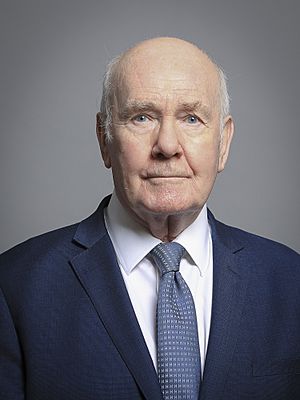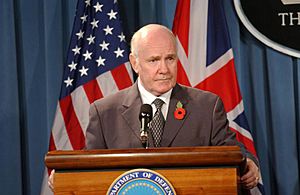John Reid, Baron Reid of Cardowan facts for kids
Quick facts for kids
The Lord Reid of Cardowan
|
|||||||||||||||||||||||||||||
|---|---|---|---|---|---|---|---|---|---|---|---|---|---|---|---|---|---|---|---|---|---|---|---|---|---|---|---|---|---|

Official portrait, 2020
|
|||||||||||||||||||||||||||||
| Home Secretary | |||||||||||||||||||||||||||||
| In office 5 May 2006 – 27 June 2007 |
|||||||||||||||||||||||||||||
| Prime Minister | Tony Blair | ||||||||||||||||||||||||||||
| Preceded by | Charles Clarke | ||||||||||||||||||||||||||||
| Succeeded by | Jacqui Smith | ||||||||||||||||||||||||||||
| Secretary of State for Defence | |||||||||||||||||||||||||||||
| In office 6 May 2005 – 5 May 2006 |
|||||||||||||||||||||||||||||
| Prime Minister | Tony Blair | ||||||||||||||||||||||||||||
| Preceded by | Geoff Hoon | ||||||||||||||||||||||||||||
| Succeeded by | Des Browne | ||||||||||||||||||||||||||||
| Secretary of State for Health | |||||||||||||||||||||||||||||
| In office 13 June 2003 – 6 May 2005 |
|||||||||||||||||||||||||||||
| Prime Minister | Tony Blair | ||||||||||||||||||||||||||||
| Preceded by | Alan Milburn | ||||||||||||||||||||||||||||
| Succeeded by | Patricia Hewitt | ||||||||||||||||||||||||||||
| Leader of the House of Commons | |||||||||||||||||||||||||||||
| In office 4 April 2003 – 13 June 2003 |
|||||||||||||||||||||||||||||
| Prime Minister | Tony Blair | ||||||||||||||||||||||||||||
| Deputy | Ben Bradshaw | ||||||||||||||||||||||||||||
| Preceded by | Robin Cook | ||||||||||||||||||||||||||||
| Succeeded by | Peter Hain | ||||||||||||||||||||||||||||
| Lord President of the Council | |||||||||||||||||||||||||||||
| In office 4 April 2003 – 13 June 2003 |
|||||||||||||||||||||||||||||
| Prime Minister | Tony Blair | ||||||||||||||||||||||||||||
| Preceded by | Robin Cook | ||||||||||||||||||||||||||||
| Succeeded by | The Lord Williams of Mostyn | ||||||||||||||||||||||||||||
| Minister without Portfolio Chairman of the Labour Party |
|||||||||||||||||||||||||||||
| In office 24 October 2002 – 4 April 2003 |
|||||||||||||||||||||||||||||
| Prime Minister | Tony Blair | ||||||||||||||||||||||||||||
| Preceded by | Charles Clarke | ||||||||||||||||||||||||||||
| Succeeded by | Ian McCartney | ||||||||||||||||||||||||||||
| First Minister of Northern Ireland | |||||||||||||||||||||||||||||
| In office 14 October 2002 – 24 October 2002 |
|||||||||||||||||||||||||||||
| Monarch | Elizabeth II | ||||||||||||||||||||||||||||
| Prime Minister | Tony Blair | ||||||||||||||||||||||||||||
| Preceded by | David Trimble (FM) Mark Durkan (dFM) |
||||||||||||||||||||||||||||
| Succeeded by | Paul Murphy | ||||||||||||||||||||||||||||
| Secretary of State for Northern Ireland | |||||||||||||||||||||||||||||
| In office 25 January 2001 – 24 October 2002 |
|||||||||||||||||||||||||||||
| Prime Minister | Tony Blair | ||||||||||||||||||||||||||||
| Preceded by | Peter Mandelson | ||||||||||||||||||||||||||||
| Succeeded by | Paul Murphy | ||||||||||||||||||||||||||||
| Secretary of State for Scotland | |||||||||||||||||||||||||||||
| In office 17 May 1999 – 25 January 2001 |
|||||||||||||||||||||||||||||
| Prime Minister | Tony Blair | ||||||||||||||||||||||||||||
| Preceded by | Donald Dewar | ||||||||||||||||||||||||||||
| Succeeded by | Helen Liddell | ||||||||||||||||||||||||||||
|
|||||||||||||||||||||||||||||
|
|||||||||||||||||||||||||||||
| Personal details | |||||||||||||||||||||||||||||
| Born |
John Reid
8 May 1947 Bellshill Maternity Hospital, North Lanarkshire, Scotland |
||||||||||||||||||||||||||||
| Political party | Labour (since 1979) | ||||||||||||||||||||||||||||
| Other political affiliations |
Communist Party of Great Britain (1972–1979) Young Communist League (1972–1979) |
||||||||||||||||||||||||||||
| Spouses |
|
||||||||||||||||||||||||||||
| Children | Kevin · Mark | ||||||||||||||||||||||||||||
| Alma mater | The Open University University of Stirling (BA, PhD) |
||||||||||||||||||||||||||||
| Signature |  |
||||||||||||||||||||||||||||
John Reid, Baron Reid of Cardowan (born 8 May 1947) is a British politician from the Labour Party. He held many important government jobs, called Cabinet positions, when Tony Blair was Prime Minister. These jobs included being Home Secretary, the person in charge of the country's security and immigration.
Reid was a Member of Parliament (MP) from 1987 to 2010. An MP is someone elected to represent people in the House of Commons. Since 2010, he has been a member of the House of Lords, another part of the UK Parliament.
Contents
Early Life and Education
John Reid was born in Bellshill, Scotland, to a working-class family. His mother, Mary, worked in a factory, and his father, Thomas, was a postman. He went to St Patrick's High School in Coatbridge.
As a young man, Reid decided not to go to university right away. He worked several jobs, including in construction and insurance. These experiences showed him the poverty some people faced and made him want to get involved in politics.
Later, he studied at the Open University and then the University of Stirling. He earned a degree in history and a PhD in economic history. His PhD research was about the history of the Kingdom of Dahomey in Africa.
From 1983 to 1985, he was a political adviser to the Labour Party leader Neil Kinnock. In 1987, he was elected to Parliament as the MP for Motherwell North.
A Career in Government
When the Labour Party won the election in 1997, John Reid began a long career in government. He was known as a skilled and tough politician who could handle difficult jobs.
Minister for the Armed Forces and Transport
Reid's first major role was as Armed Forces Minister. He helped with a big review of the UK's military, which was seen as a great success.
In 1998, he became the Minister for Transport. His main task was to make sure the Jubilee Line Extension of the London Underground was finished on time for the year 2000. He and his team succeeded, and he was seen as a reliable problem-solver.
Working for Scotland and Northern Ireland
In 1999, Reid was promoted to Secretary of State for Scotland. This was an important time because the Scottish Parliament was being set up again after 300 years.
In 2001, he became the Secretary of State for Northern Ireland. He was the first Roman Catholic to hold this job. He worked hard to bring peace and reduce violence between different communities. He helped oversee the change of the police force from the RUC to the Police Service of Northern Ireland. He also played a part in the process that led to the Provisional Irish Republican Army (IRA) giving up its weapons.
Health Secretary
In 2003, Reid became the Secretary of State for Health. He brought in changes to the National Health Service (NHS). One of his goals was to give patients more choices about their healthcare. He also started a public discussion about how to improve the nation's health, including plans to make more workplaces smoke-free.
Defence Secretary

After the 2005 election, Reid was made Secretary of State for Defence. In this role, he was in charge of the UK's armed forces.
In 2006, he sent 3,300 British troops to Helmand province in Afghanistan. He said their job was to protect the rebuilding of the area. He hoped they could leave in three years "without firing one shot." However, the mission turned out to be much more difficult than expected.
In 2010, he spoke to the Iraq Inquiry about his time as Defence Secretary. He expressed his sadness for the loss of life during the war in Iraq.
Home Secretary
In May 2006, Reid took on one of the biggest jobs in government: Home Secretary. This person is responsible for the police, national security, and immigration.
Reid said the Home Office was "not fit for purpose" and needed major changes to deal with modern challenges like terrorism and crime. He introduced plans to build more prisons and create a uniformed border staff.
During his time as Home Secretary, the police stopped a major terror plot in August 2006. The plot involved a plan to blow up airplanes flying from the UK to the USA and Canada. Reid announced that the country was on its highest security alert and praised the police for their work.
Life After Leaving the Cabinet
In 2007, when Tony Blair stepped down as Prime Minister, Reid also decided to leave his Cabinet position. He said he would support the new Prime Minister, Gordon Brown. Reid did not run for re-election as an MP in 2010.
Member of the House of Lords
In 2010, Reid was made a life peer, which means he became a member of the House of Lords. His official title is Baron Reid of Cardowan. In the House of Lords, he continues to take part in political debates.
He played a leading role in the "No" campaign for the 2011 referendum on the voting system. He also campaigned against Scottish independence in the 2014 referendum.
Outside of Politics
After leaving frontline politics, John Reid has been involved in other activities.
- Football: In 2007, he became the Chairman of Celtic Football Club, the team he has supported his whole life. He called the job "an honour and a privilege."
- University: He became an honorary Professor at University College London (UCL) and the chairman of its Institute of Security and Resilience Studies.
- Business: He has also worked as a consultant for G4S, a global security company.
Images for kids
-
Reid and United States Secretary of Defense Donald Rumsfeld answer press questions in Taormina, Sicily (9 February 2006)
See also
 In Spanish: John Reid (político) para niños
In Spanish: John Reid (político) para niños
 | Valerie Thomas |
 | Frederick McKinley Jones |
 | George Edward Alcorn Jr. |
 | Thomas Mensah |


